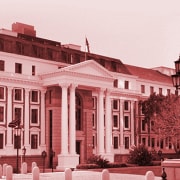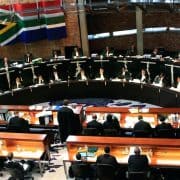|
Getting your Trinity Audio player ready...
|
The unprecedented removal of Busisiwe Mkhwebane as public protector highlights the importance of selecting the right person for a job – especially one of such importance – through a rigorous process that disregards party or cadre issues and focuses solely on merit and suitability.
Never before has a South African public protector been removed from office before their term is up. While Mkhwebane’s tenure might be almost at an end anyway – she was due to step down in October 2023 – in the interests of South African law and order there was no time to wait.
In accordance with the National Assembly’s (NA) adoption of the resolution to remove Mkhwebane from office, and in terms of Section 194(3)(b) of the Constitution, located in chapter 9, President Cyril Ramaphosa removed her on the grounds of misconduct and incompetence.
This section does not allow for any leeway on the president’s part, as it stipulates that once the NA has adopted such a resolution through a two-thirds majority vote, the president must – not may – act according to that vote.
Mkhwebane has since announced her intention to challenge Ramaphosa’s decision, the Constitution notwithstanding.
Campaigning for transparent appointments
Since 2016, Corruption Watch (CW) has advocated for transparent and fair appointment processes, specifically in the appointment of leaders to key crime and corruption fighting institutions in South Africa.
The objectives of this work are largely to ensure that candidates are appointed in a transparent manner, assessed against clear merit-based and objective criteria, and that avenues for public participation in appointment processes are available. For instance, we wanted candidates’ CVs (redacted where necessary) to be published online so that the public could scrutinise and vet them.
Ironically, it was during the appointment process for the fourth public protector that we launched this campaign, and while we supported the process itself because the outgoing public protector Thuli Madonsela had set a high standard and we were of the view that it should be maintained, we were not involved in the actual selection of a candidate and consequently did not take a stance on that aspect.
Since then we have conducted extensive public awareness and advocacy campaigns around transparency and merit-based selection in the appointments of the public protector, the national police commissioner, the executive director of the Independent Police Investigative Directorate, the inspector-general of intelligence, the deputy public protector, the auditor-general, the National Lotteries Commission board chairperson, South African Human Rights Commissioners, board members of the National Youth Development Agency, and members of the Commission on Gender Equality.
In 2019 CW, with the Institute for Security Studies, submitted a document to the Zondo commission detailing our concerns around the apparent manipulation of criminal justice agencies for personal gain, and importantly, making several recommendations to address the current situation, strengthen the leadership of these agencies, and prevent such deterioration from happening again.
We followed that submission up with one recommending improving parliamentary appointment processes, also ministerial and presidential appointments, and potentially the selection of municipal managers at local government level.
Our written and oral arguments were well received and considered, to the extent that in the final report of the Zondo commission, Chief Justice Raymond Zondo recommended that Parliament “consider whether it is desirable to amend its rules to give effect to the proposals by Corruption Watch on appointments by Parliament.”
Section 194 inquiry
On 3 December 2019, the NA adopted rules setting out the process for the removal of office-bearers in institutions supporting constitutional democracy – known as Chapter 9 institutions. These institutions include the Office of the Public Protector. The rules form part of the Rules of the National Assembly and apply to the removal of any office-bearer in an institution supporting constitutional democracy.
On 21 February 2020, the Democratic Alliance tabled a motion to initiate an enquiry, in terms of section 194, for Mkhwebane’s removal on the grounds of alleged incompetence and/or misconduct. Former speaker Thandi Modise established an independent panel, chaired by retired Constitutional Court justice Bess Nkabinde, to conduct a preliminary assessment to determine whether, on the information available, there was prima facie evidence of misconduct and incompetence on the part of the public protector.
The panel’s report, submitted in February 2021, indeed found prima facie evidence of incompetence and misconduct on Mkhwebane’s part. It recommended that the charges of incompetence and misconduct be referred to an NA committee, as provided for in the removal rules. The NA discussed the matter on 16 March 2021 and resolved to proceed with the Section 194 enquiry.
Despite three attempts by Mkhwebane to derail the process in court, her challenges were dismissed. In June 2021 Corruption Watch and the Council for the Advancement of the South African Constitution joined, as amici curiae, her third application to have Parliament’s rules for the removal of the head of a Chapter 9 institution, declared unconstitutional. The two organisations supported the inquiry.
The Western Cape High Court noted that the removal rules are “principally and constitutionally in the public interest” and warned that courts “should not lightly interfere with such processes unless an applicant has demonstrated exceptional circumstances which … the applicant has failed to do”. Modise echoed this sentiment, saying that because the president and NA have been assigned, in terms of the Constitution, the power to determine the fitness of a person to continue to hold the office of public protector, a court should not get involved.
The Section 194 inquiry sat for arguably far longer than it should have, having been established in April 2021. It began hearings on 11 July 2022, Mkhwebane fighting tooth and nail all along the way, and wrapped up its work in August 2023.
What the Constitution says
Removal from office –
- 194. (1) The Public Protector, the Auditor-General or a member of a Commission established by this Chapter may be removed from office only on
- the ground of misconduct, incapacity or incompetence;
- a finding to that effect by a committee of the National Assembly; and
- the adoption by the Assembly of a resolution calling for that person’s removal from office.
- (2) A resolution of the National Assembly concerning the removal from office of
- the Public Protector or the Auditor-General must be adopted with a supporting vote of at least two thirds of the members of the Assembly; or
- a member of a Commission must be adopted with a supporting vote of a majority of the members of the Assembly.
- (3) The President
- may suspend a person from office at any time after the start of the proceedings of a committee of the National Assembly for the removal of that person; and
- must remove a person from office upon adoption by the Assembly of the resolution calling for that person’s removal.








